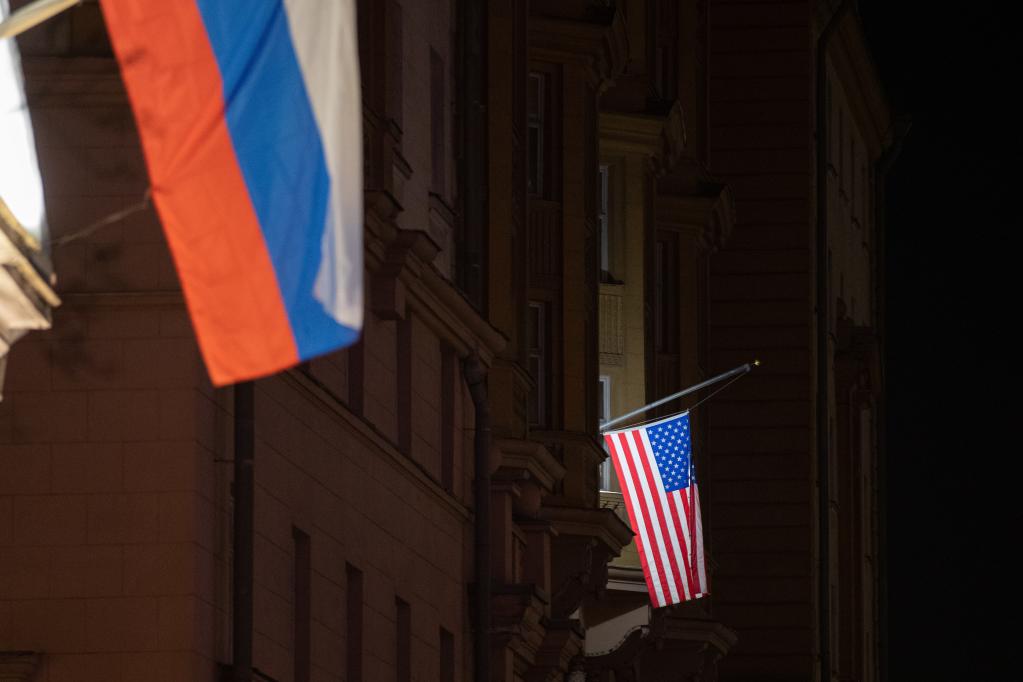Commentary: Washington's small-clique politics won't fool SE Asia

Photo taken on Nov. 23, 2021 shows the White House in Washington, D.C., the United States. (Photo by Ting Shen/Xinhua)
*The U.S. administration has long taken pleasure in organizing destructive meetings under the guise of constructive engagements.
*The so-called "Indo-Pacific Strategy" it is selling at this summit, for example, claims to maintain regional freedom and openness and respect ASEAN centrality in regional affairs, but in reality incites confrontation, undermines unity, and threatens cooperation and development in the region through such exclusive geopolitical blocs as AUKUS and Quad.
BEIJING, May 13 (Xinhua) -- The White House is peddling its so-called "Indo-Pacific Strategy" against China and ramping up its pressure campaign of the Russia-Ukraine conflict during a two-day summit in Washington with leaders of the Association of Southeast Asian Nations (ASEAN).
But its hope to pull ASEAN members into its camp will shrivel, as ASEAN countries have already woken up to Washington's typical hegemony, hypocrisy and egomania.
The arrangement of the summit itself has laid bare Washington's double-dealing nature. Its disrespect for ASEAN members concerning scheduling issues despite its pledge of "enduring commitment" has sparked a wave of complaints among ASEAN members, resulting in a postponement of the summit from late March to May.
Cambodian Minister attached to the Prime Minister Kao Kim Hourn said before the summit that if Washington was serious about improving its ties with ASEAN, it should have arranged bilateral meetings between the United States and ASEAN countries. ASEAN leaders "should be treated with respect and equality," he noted.
The U.S. administration has long taken pleasure in organizing destructive meetings under the guise of constructive engagements. The so-called "Indo-Pacific Strategy" it is selling at this summit, for example, claims to maintain regional freedom and openness and respect ASEAN centrality in regional affairs, but in reality incites confrontation, undermines unity, and threatens cooperation and development in the region through such exclusive geopolitical blocs as AUKUS and Quad.
Many sober minds in ASEAN have seen through this duplicity and bullying. Indonesia and Malaysia warned that AUKUS could lead to a major arms race in the region. A recent report by the U.S. Center for Strategic and International Studies showed that many ASEAN members have expressed concerns that the so-called "Indo-Pacific Economic Framework" is "primarily a political endeavor meant to counter China, rather than a sincere and thoughtful economic policy integration initiative."

Photo taken on March 24, 2022 shows the U.S. national flag (R) on the U.S. Embassy building in Moscow, Russia. (Xinhua/Bai Xueqi)
Meanwhile, the White House will attempt in vain during this summit to talk ASEAN into imposing sanctions against Russia. Ever since the escalation of the current Ukraine crisis, Washington has been trying to exert pressure on ASEAN to take sides, but most of ASEAN members did not follow suit.
On April 7, six of the 10-member bloc abstained from voting in favor of a resolution to remove Russia from the United Nations Human Rights Council, and two voted against it. Long adhering to an independent foreign policy, ASEAN members have urged solving the crisis through negotiation and dialogue.
Moreover, some ASEAN members have been well aware of Washington's unspoken calculations to turn bloody sufferings of others into golden opportunities for profits in the Russia-Ukraine conflict. For example, during his visit to China in early April, Thai Deputy Prime Minister and Foreign Minister Don Pramudwinai said he appreciates China's objective and fair position on the Ukraine issue, that "Asian countries should maintain peace and stability in the region, jointly resist unilateral sanctions and long-arm jurisdiction that have no basis in international law, and prevent attempts to create tensions and replicate crises in the region."
Playing small clique politics and forcing others to take sides -- Washington's old tricks to gain geopolitical interests -- work against ASEAN's will to uphold regional peace and stability and to realize sustainable economic development. Launching trade wars and breaking pacts -- Washington's classical acts of unilateralism -- severely disrupt normal trade exchanges and supply chains in the region and deal a heavy blow to ASEAN's economy. All those wrongdoings have tarnished Washington's credit and influence as the world's sole superpower, and driven it further apart from ASEAN members.
The long arc of history teaches each and every country that acting without scruples almost always results in the reverse of what one desires. It is time for Washington to learn this lesson, abandon its old dream of Cold War hegemony, uphold an open and inclusive mindset, and play its due role in maintaining regional and global peace, stability and development.
Photos
Related Stories
- How Washington's zero-sum fixation is derailing its own agenda
- U.S. should return to rational, pragmatic policy toward China
- China-U.S. economic, trade relations win-win in nature: Chinese ambassador to U.S.
- China expresses strong opposition to U.S. lawmakers' visit to Taiwan
- China is not interested in challenging or replacing others: FM spokesperson
- China firmly opposes U.S. congressmen's visit to Taiwan: spokesperson
- China urges U.S. to honor commitment to not support "Taiwan independence"
- Chinese embassy in U.S. expresses strong opposition to U.S. lawmakers' visit to Taiwan
- Commissioner's office of Chinese foreign ministry in HKSAR slams U.S. human rights report
- U.S. urged to protect rights of ethnic minorities
Copyright © 2022 People's Daily Online. All Rights Reserved.










